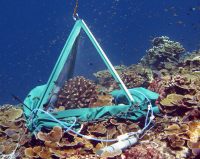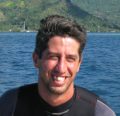
This week, PeerJ was pleased to launch the Line Islands Collection, with 4 initial publications. To mark the launch we asked Andreas Haas (of the Rohwer Lab in the Department of Biology at San Diego State University) to write a guest blog post explaining some of the motivation for this series of studies. In the next few days, many of the authors of these Line Island papers are departing for their 2013 expedition – you can find more information at the Coral Reef Systems web site.
PeerJ Collections are a great option for publishing Conference Proceedings, or the output of research groups such as this one. If you would like a PeerJ Collection for your own group then check out this post for more information.

Dr Haas’s guest blog post is below:
“Coral reefs are among the most valuable and, owing to the rich diversity of life they support, arguably one of the most beautiful ecosystems on Earth. They provide a multitude of economic and environmental services such as food, protection for coastal regions, and tourism. In spite of their immense value, these ecosystems face serious threats primarily arising from a changing climate, unsustainable fishing, and local pollution. By just looking at different reef locations along a gradient of human exposure it becomes obvious that coral reefs are in decline, as a result of human carelessness and exploitation. Previous and upcoming expeditions to the Central Pacific, particularly to the Line Islands, where some of the world’s most remote tropical coral reef systems are located, provide us with an undeceiving picture of how anthropogenic influence – even as marginal as on those remote islands – changes the face of these remarkably complex ecosystems.
Our research is driven by the demand to better understand the mechanisms underlying the alterations in coral reef community compositions. Therefore, we focus on interactions between the microbial community and macro-organisms, such as fish, coral, or algae, as well as the effects of these micro- and macro- organisms on key water parameters like oxygen, carbon, or nutrient concentrations The joint efforts of different laboratories – amongst others, the Rohwer Lab at San Diego State University, which is looking at microbial dynamics, the Smith and Sandin labs at Scripps Institution of Oceanography which are investigating benthic and pelagic communities, the Carlson Lab at UCSB which analyzes the organic matter dynamics – allow for a multidisciplinary approach for identifying mechanisms which shape the structure of different communities.

This effort to understand the biogeochemical processes which structure coral reef ecosystems is an ongoing endeavor, spanning spatial scales from microns to thousands of kilometers, comprising not only coral reef systems but also temperate and cold water systems. Thanks to the opportunity provided by PeerJ, we can present these studies together in one consistent collection, which will enable researchers to conceptualize these findings in their broader context. We hope that these results may provide new aspects for the development of effective management, conservation, and restoration strategies for coral reefs.”
Dr Andreas Haas

